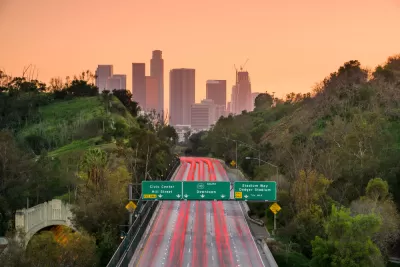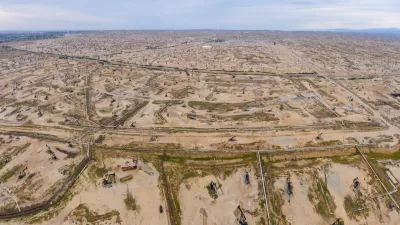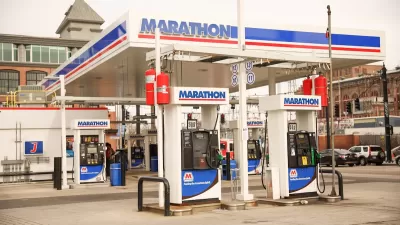Encouraging compact land use by allowing density, building near transit, and eliminating parking minimums can have a powerful effect on the emissions a city generates.

Liberal cities around the country have mayors who love to talk about climate change, but while there are proven strategies to curb emissions in cities, many of these same mayors are afraid to upset the status quo. Transportation is the main source of emissions in the United States, so "[m]ayors can play a big role in reducing per capita energy consumption by facilitating more efficient modes of travel and more compact land use," argues Angie Schmitt.
Eliminating parking requirements is one strategy that's been implemented in Mexico City. Parking requirements make building more expensive and serve as built-in support for private vehicles over public transit. While a few U.S. cities have taken steps to reduce some requirements, none has gone as far as the Mexican capital.
Other strategies Schmitt champions in her article include creating space for sustainable transit in the form of bus and bike lanes, allowing housing near transit, and narrowing streets and slowing vehicle traffic to make the public realm safer for walkers and bikers.
FULL STORY: You’re No “Climate Mayor” If You’re Not Doing These Four Things

Study: Maui’s Plan to Convert Vacation Rentals to Long-Term Housing Could Cause Nearly $1 Billion Economic Loss
The plan would reduce visitor accommodation by 25,% resulting in 1,900 jobs lost.

North Texas Transit Leaders Tout Benefits of TOD for Growing Region
At a summit focused on transit-oriented development, policymakers discussed how North Texas’ expanded light rail system can serve as a tool for economic growth.

Using Old Oil and Gas Wells for Green Energy Storage
Penn State researchers have found that repurposing abandoned oil and gas wells for geothermal-assisted compressed-air energy storage can boost efficiency, reduce environmental risks, and support clean energy and job transitions.

Private Donations Propel Early Restoration of Palisades Playground
Los Angeles has secured over $1.3 million in private funding to restore the Pacific Palisades playground months ahead of schedule, creating a modern, accessible space that supports community healing after recent wildfires.

From Blight to Benefit: Early Results From California’s Equitable Cleanup Program
The Equitable Community Revitalization Grant (ECRG) program is reshaping brownfield redevelopment by prioritizing projects in low-income and environmental justice communities, emphasizing equity, transparency, and community benefits.

Planting Relief: Tackling Las Vegas Heat One Tree at a Time
Nevada Plants, a Las Vegas-based nonprofit, is combating the city’s extreme urban heat by giving away trees to residents in underserved neighborhoods, promoting shade, sustainability, and community health.
Urban Design for Planners 1: Software Tools
This six-course series explores essential urban design concepts using open source software and equips planners with the tools they need to participate fully in the urban design process.
Planning for Universal Design
Learn the tools for implementing Universal Design in planning regulations.
Ascent Environmental
Borough of Carlisle
Institute for Housing and Urban Development Studies (IHS)
City of Grandview
Harvard GSD Executive Education
Toledo-Lucas County Plan Commissions
Salt Lake City
NYU Wagner Graduate School of Public Service





























